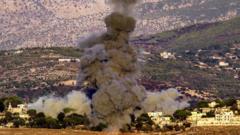Israel has notified the US that it intends to launch a limited ground incursion into Lebanon, American officials have said.
The operation could start as soon as Monday, an official earlier told the BBC’s US partner CBS.
Israel’s Defence Minister Yoav Gallant earlier implied the army was ready for a ground operation, telling troops near the Lebanese border Israel was prepared to use forces “from the air, sea, and land” to target Hezbollah.
Hezbollah’s deputy leader said the group is prepared for any Israeli operation inside Lebanon.
There have been international calls for restraint, with the head of the UN and the EU’s foreign policy chief calling on Israel to avoid any ground incursion.
The Lebanese army is pulling back troops stationed on its southern border to at least 5km (3 miles) north, according to Reuters news agency, which cited a Lebanese security source.
Gallant told Israeli troops at the border that Israel’s military would use all “the means at our disposal” to allow displaced people to return home in the north of the country.
In a short video, he said the “elimination” of Hezbollah leader Hassan Nasrallah in Beirut on Friday “is a very important step, but it is not everything”.
He added that “everything that needs to be done – will be done” and that “we will use all the forces from the air, sea and land”.
Several explosions were heard over the capital, Beirut, late on Monday.
They came after the Israel Defense Forces (IDF) ordered residents to evacuate three areas in southern Beirut “immediately” on Monday evening.
In a post on social media, the IDF’s Arabic spokesperson Avichay Adraee said: “You are located near interests and facilities belonging to the terrorist Hezbollah, and therefore the IDF will act against them forcefully.”
The New York Times earlier reported that Israeli commando units had already made brief incursions into Lebanese territory to prepare for a possible wider invasion.
The mayor of Jdeidet Marjayoun, a Christian-majority Lebanese village less than 10 km (6.2 miles) from the border, told Reuters on Monday that two locals had received calls apparently from the Israeli army telling them to evacuate the area as soon as possible.
Hezbollah’s deputy chief Sheikh Naim Qassem said it was ready for an Israeli ground offensive. He described the group’s attacks on Israel so far as the “minimum”, adding that the battle could be long.
The European Union’s member states have called for an urgent meeting of the UN Security Council. EU foreign policy chief Josep Borrell said “any further military intervention would dramatically aggravate the situation and it has to be avoided”.
UN chief Antonio Guterres does “not want to see any sort of ground invasion” of Lebanon by Israel, the secretary general’s spokesman said.
On Monday, US President Joe Biden said “we should have a ceasefire now”.
“I’m more aware than you might know and I’m comfortable with them stopping,” Biden told reporters when asked if he was comfortable with Israeli plans for a cross-border incursion.
UK Foreign Secretary David Lammy told reporters that “the best way forward is an immediate ceasefire”.
Meanwhile, Israel and Hamas have both confirmed the killing of the head of Hamas in Lebanon, Fateh Sherif Abu el-Amin, in Israeli strikes in southern Lebanon.
Israel’s military said Sherif was “responsible for coordinating Hamas’s terror activities in Lebanon with Hezbollah operatives”.
Another Israeli strike in the central Beirut neighbourhood of Kola early on Monday killed three members of the Popular Front for the Liberation of Palestine (PFLP), the Palestinian armed group said in a statement.
The statement named those killed as military security chief Mohammad Abdel-Aal, military commander Imad Odeh, and fighter Abdel Rahman Abdel-Aal.
Médecins Sans Frontières (MSF) director of communications for Lebanon, Jinane Saad, told the BBC that “we don’t really know where is safe or not” after the strike on the Kola neighbourhood.
“What is safe today might not be safe in an hour or tomorrow,” she said.
Israeli planes also attacked the Houthi-controlled port of Hodeidah in Yemen on Sunday, causing a huge explosion.
The previously sporadic cross-border fighting between Israel and Hezbollah escalated on 8 October, 2023 – the day after the unprecedented attack on Israel by Hamas gunmen from the Gaza Strip – when Hezbollah fired at Israeli positions, in solidarity with the Palestinians.
However, things have escalated dramatically in recent weeks.
Hezbollah has experienced mass casualties from exploding pagers and walkie-talkies, a wave of assassinations of Hezbollah military commanders, devastating air strikes which have killed civilians – and the use of bunker-busting bombs in Beirut, which killed Hezbollah leader Hassan Nasrallah on Friday.
Lebanese officials say more than 1,000 people have been killed in the past two weeks, while up to a million may now be displaced.

